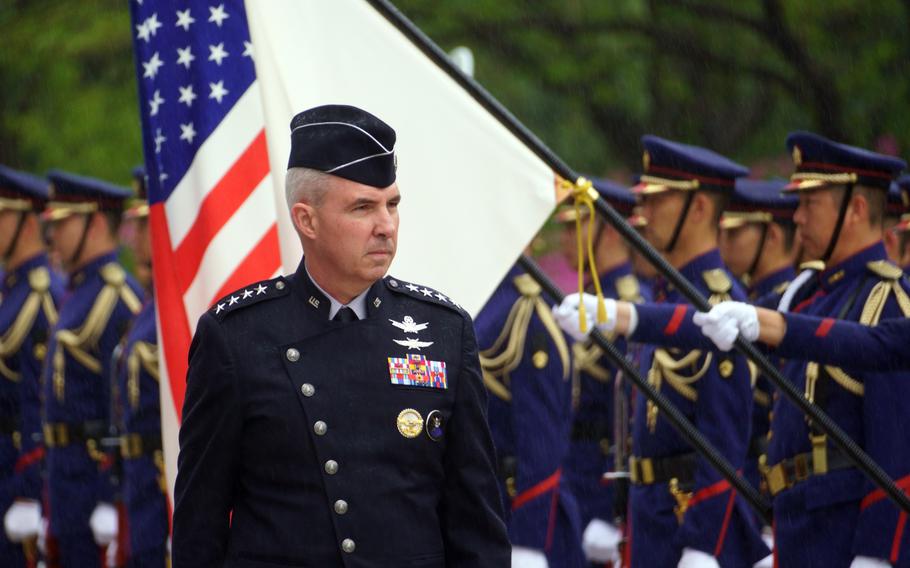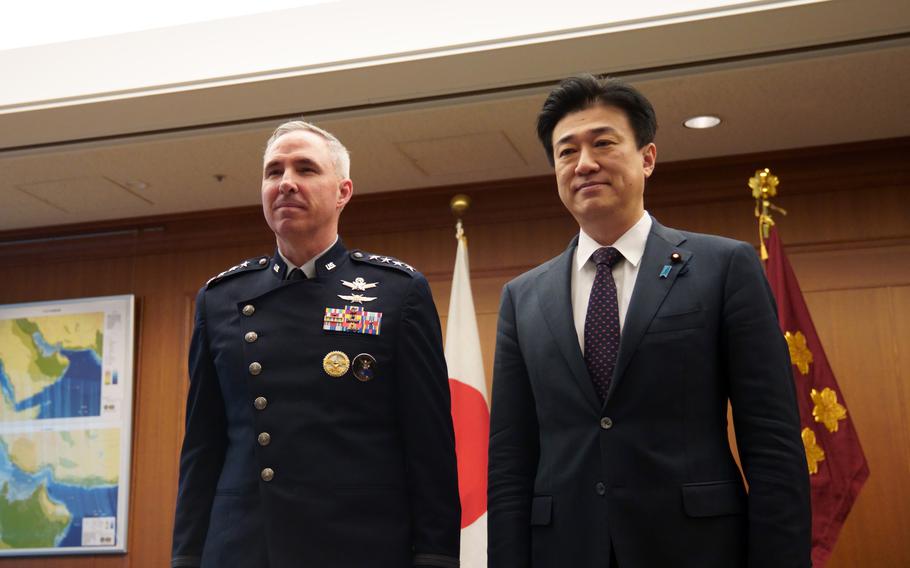
The head of U.S. Space Command, Space Force Gen. Stephen Whiting, visits Japan's Ministry of Defense in Tokyo, April 24, 2024. (Akifumi Ishikawa/Stars and Stripes)
TOKYO — U.S. Space Command’s new leader warned of China’s rapidly advancing space capabilities this week following meetings with his South Korean and Japanese counterparts.
“We’re seriously focused at U.S. Space Command on our pacing challenge, which is the People’s Republic of China,” Space Force Gen. Stephen Whiting told reporters during an online press conference from Japan’s capital Wednesday.
The Tokyo stop was part of a tour that has included visits to South Korea and U.S. Indo-Pacific Command in Hawaii.
Beijing is “moving at breathtaking speed in space,” Whiting said, noting that China is rapidly developing a range of counter-space weapons that threaten American space capabilities.
“They’re also using space to make their terrestrial forces — their army, their navy, their marine corps, their air force — more precise, more lethal and more far-ranging,” he said.
The general, who took charge of Space Command in January, also met Japanese Defense Minister Minoru Kihara and top military leaders.
Whiting held up Japan’s new Space Operations Group, which he also visited this week, as an example during his talks in Japan and South Korea.
“Their focus on space domain awareness along with ours to keep track of those threats in space that we see — and many of those are emanating from China — has put an impetus on us developing improved space domain awareness capability,” he told reporters.

The head of U.S. Space Command, Space Force Gen. Stephen Whiting, visits Japanese Defense Minister Minoru Kihara at the ministry's headquarters in Tokyo, April 24, 2024. (Akifumi Ishikawa/Stars and Stripes)
Japan is preparing to field a deep-space radar that will provide better understanding of what China is doing in space, Whiting said.
The U.S. is partnering with Japan to launch new satellites that will monitor space from orbit, he said, adding that he visited a Mitsubishi satellite factory during his trip.
Chinese activities on the Moon are also on Space Command’s radar.
“Those appear to be exploratory and scientific on the surface, but the Chinese aren’t very transparent with what they do in space,” he said. “So, we hope there’s not a military component to that, but we would certainly welcome more transparency.”
Whiting said he’s interested in having space domain awareness reach lunar orbit.
“We want to make sure that any activities that happen on the Moon are indeed for science purposes and exploration and that no one is going to the Moon for military purposes,” he said.
Space Command operated from 1985 to 2002 and was reestablished in August 2019. It differs from the Space Force, an independent service branch established in December 2019.
Space Command guards America’s space assets and protects U.S. and allied forces from potential space-enabled attacks, Whiting said.
The U.S. military has been collaborating and training in the space domain with Japan and South Korea, the general added.
“We find that when we operate in a unified fashion with our allies and partners, that builds deterrence and ensures that there will never be a day without space for our militaries and for our national populations,” he said.
Whiting was next headed to Kwajalein Atoll, where the Air Force recently conducted its first hypersonic missile test in the Western Pacific.